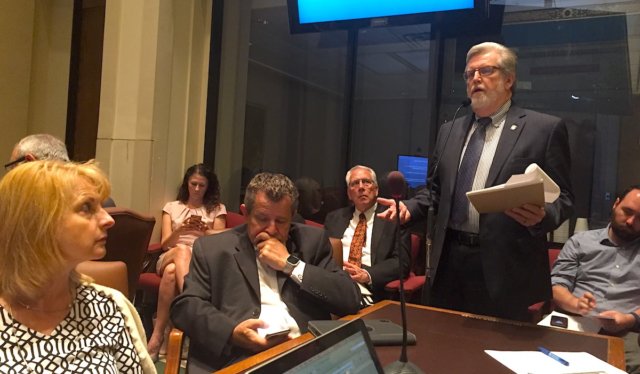

As former deputy secretary of environment Tyler Powell approached his final day of state employment in early September, he hired an attorney and filed formal recusals to make sure he violated no laws ahead of his new job: contract lobbyist.
Powell, who has co-founded CSS Partners and is still recruiting clients, aired his concerns in front of the Oklahoma Ethics Commission this morning about a proposed rule that would require a two-year “cooling off period” during which former lawmakers and state employees could not register as lobbyists.
“I do have concerns with the potential retroactive nature. Especially for being a state employee for a decent amount of time,” Powell told commissioners in a packed Capitol conference room. “I am caught — theoretically, if this rule goes into effect — there could still be a ‘cooling off period’ of a year or so.”
Other lobbyists, lawmakers, state agency liaisons and the head of the state employee union also voiced their concerns and questions during the commission’s first public hearing about the rule, which surfaced on an agenda last week.
“We appreciate all the comments, and we will address the questions moving forward,” said commission chairman John Hawkins at the conclusion of spectators’ remarks. “Nothing is written in stone, if you will. We’re sensitive of the constitutionality of this, and we’re also sensitive to the ramifications.”
Those ramifications could include delaying Powell’s ability to operate his small business, and they could require Senate President Pro Tempore Mike Schulz (R-Altus) to file for a waiver when he terms out of the Legislature after the 2018 session. Schulz has announced his intention to apply for the position of executive director with the Oklahoma Farm Bureau, an organization for which he worked prior to being elected in 2006.
Schulz would appear to qualify for a waiver based on the commission’s current “pre-existing relationship” clause, although his plans to join the Farm Bureau have raised eyebrows among Capitol insiders who are concerned that the man leading the State Senate next session will be awaiting employment at an entity lobbying him.
‘It created an underground network’
Thursday morning, four of Schulz’s legislator colleagues spoke critically of the proposed rule, which could have affected several former lawmakers who left their seats in recent years and became lobbyists.
“There may be a few bad apples that come along every now and then, but the majority of people up here, their priority is the people of Oklahoma,” said Sen. Roger Thompson (R-Okmulgee), who explained how he could possibly be prohibited from returning to the economic development work he did prior to election. “I think we already have laws in place that can lock people up for [unethical behavior], and we probably have examples of that.”
Rep. John Enns (R-Enid) said he is concerned about how the proposed rule could exacerbate the effect of term limits, which Capitol insiders have criticized for depriving the Legislature of institutional knowledge.
“We’ve cut down our institutional knowledge on how things work up here quite a bit,” Enns said. “There are some bad actors out here, and they are typically caught.”
Rep. Bobby Cleveland (R-Slaughterville) simply said the commission was over-regulating.
“You guys, to put it bluntly, are going overboard with your rules,” Cleveland said. “You’re making it difficult for us. We shouldn’t be changing rules every month.”
But Rep. John Paul Jordan (R-Yukon) focused on what might happen if such a rule took effect. He said a similar requirement in Texas means companies hire former lawmakers as “consultants” who are functionally down the hall from legislators who meet with the technical lobbyists.
“What that ended up doing was it created an underground network,” Jordan said. “They can’t get hired as a lobbyist, so they get hired as a consultant. I’ve actually seen this in practice.
“I think you’re well-meaning. You’re wanting to have more transparency. That’s what you’re going for. But the ones who are bad actors, they will figure out how to be bad actors. They will find a way to go underneath you.”
‘You are affecting people who are like me’
While lawmakers becoming lobbyists is one target of the proposed “cooling off period,” Powell was not the only person concerned with how state employees would be treated.
Dawn Watson, a former reporter and legislative staffer who has become a lobbyist, discussed how she jumped from state employment to lobbying for the American Cancer Society.
“I worked for four years for the Oklahoma House of Representatives as a research analyst on non-partisan staff,” Watson said. “During that time, I was a volunteer for the (American) Cancer Society because I lost my father to cancer. I later became a survivor myself. While I was a volunteer, the opportunity came to apply for the job of government relations director for the Cancer Society, which I did.”
Watson said she appreciated that position because it afforded her a chance to fight for people who might not otherwise have a voice in the public policy arena.
“When you consider rules like this, you are affecting people who are like me,” Watson said. “As I like to speak for people who may not have a voice, that is why I am here today even though this rule would not affect me right now.”
While no members of the Ethics Commission offered comments other than Hawkins, executive director Ashley Kemp spoke at the beginning of Thursday’s meeting. She said there may be modifications or even alternatives presented to the rule in question.
“It is clear people have several concerns or comments, and they want their voices heard,” Kemp said. “This is the first, but it is not the only hearing that will be had for this rule amendment.”
Full text of proposed ‘cooling off period’ amendment
